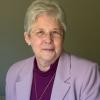It was about this time of year. We were all going about our daily routine of prayer and work. We had just completed evening prayer and we were at dinner, when one of the sisters said, "I have been waiting until we are all together to tell you about a phone call that I received today."
She told us that a man named Jack had called and said that he might know her father, and if she didn't mind, he would like to ask her a few questions. Sister said that she didn't mind, and he proceeded to tell her where he grew up and some information about his family. He seemed very connected to her father. After he had talked for a while, Sister, who can be very direct at times, asked bluntly, "Jack, are you thinking that we have the same father?"
As she spoke these words, we all stopped eating and waited for the rest of her story. It turned out that later, after this initial phone call and after some careful investigation and research, our sister found that she had a newly discovered half brother. He had a different life history because they were not raised together, but they shared the same father.
Our sister's story reminds me of two Gospels, the story of the Canaanite woman, and in another chapter of Matthew, the question about who is our brother, our sister, and our father or mother — who is the true family of Jesus?
The Canaanite woman dares to speak up to Jesus, and she reminds him that — although she is not of the family of Israel — she still shares the same father as those who are of the family of Israel, and therefore deserves to be included with those who have faith in him.
This must have been a shocking demand for the disciples and those who heard her. After all, she was a woman and clearly a foreigner, and there were strict boundaries of where you belonged, not unlike our lives today.
For example, almost daily we see clashes between the Israelis and the Palestinians. Neither side feels comfortable nor safe being in the other's territory. Violence can erupt very quickly.
Even in my own city of Saginaw, Michigan, we have boundaries that define us. One group of people live on one side of the river and another group on the other. With these boundaries comes prejudices towards each other. While driving though one side of town the message is, "Keep your doors locked." There are real prejudices of suspicion and fear.
This woman was in a similar situation of being in an unwelcoming place. Bravely she broke all protocol of the time. She was a peasant woman who dared call out to Jesus. He did not respond the first time. She called again and asked for healing for her daughter. Jesus said, "My mission is to the Jews." She dared to plead with Jesus on behalf of us saying, "Even the dogs eat the scraps from the masters' table."
So she lets him know that she understands he has been sent by God to the Jews. But she boldly asks to be included; she insists that we all need God's message that he brings, even if just the "leftovers."
Jesus was clearly moved by her words. He responds, "Woman, great is your faith!" Jesus affirms that he does bring the message of God to all who have faith in him.
If we imagine for a moment, that we are foreigners in this story needing to be healed, we would be grateful that this peasant woman pleads for us to receive even a little of Jesus' mission. In one action and affirmation Jesus agrees that both Jews and Gentiles are a part of his Good News.
To carry the analogy further, we are the healed daughters and sons for whom this woman is pleading. Through her faith, Jesus welcomes us into the family of faith.
Our sister now has a newly discovered half brother with whom she shares the same father. Our Gospel story reminds us that we share the same father, our God, with all people throughout the world. Thanks be to God.
[Laura Hammel is a member of the Sisters of St. Clare, a Poor Clare community in Saginaw, Michigan. Her projects, in addition to her prayer ministry, have included developing and maintaining a website and making blessing oil.]

